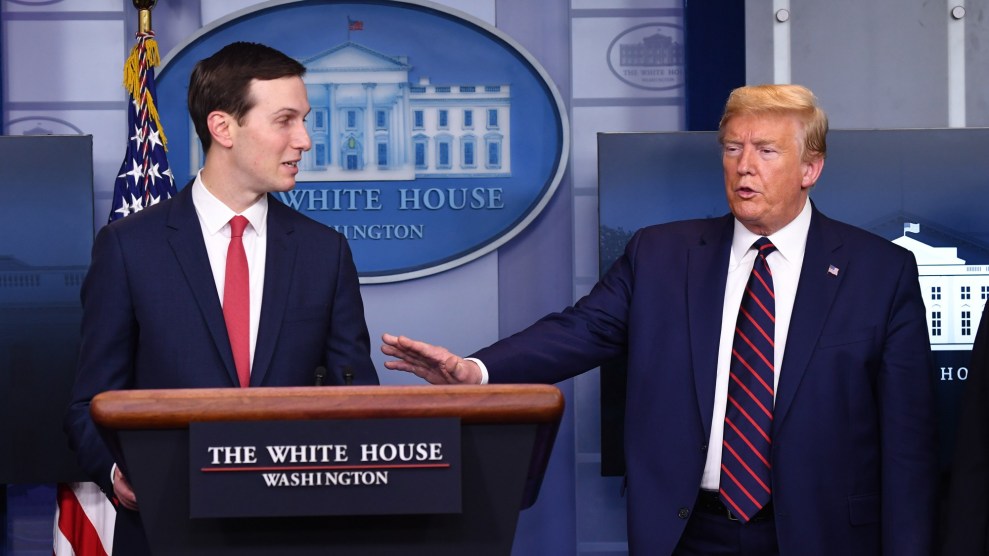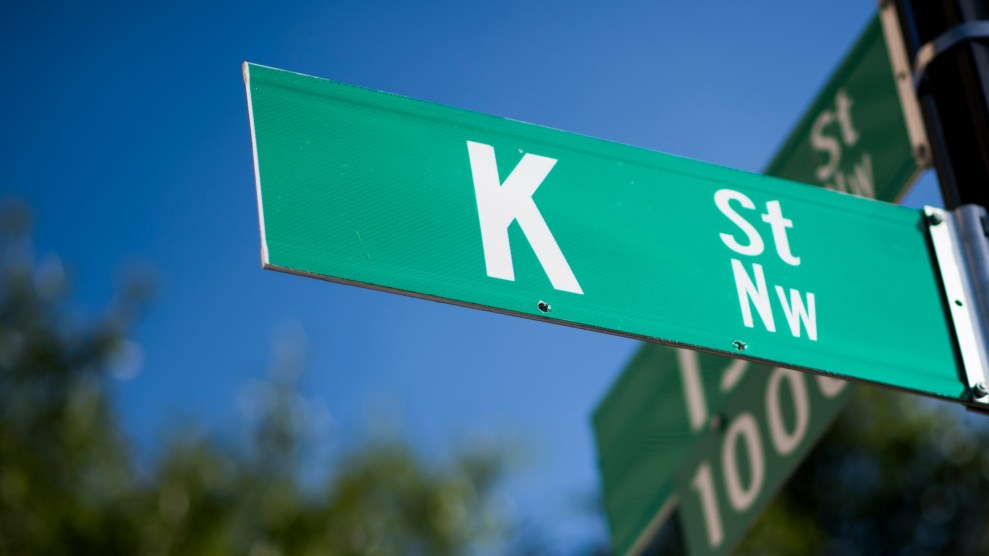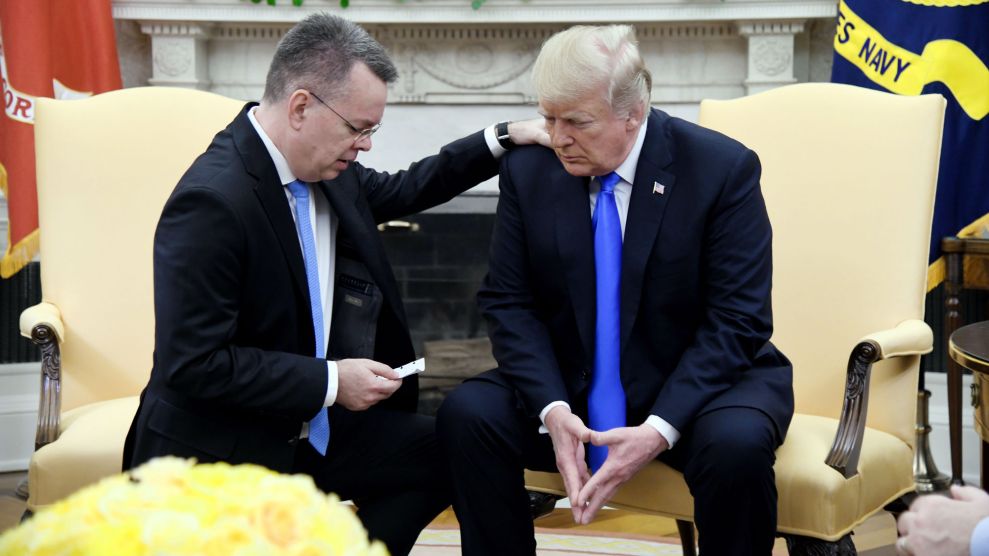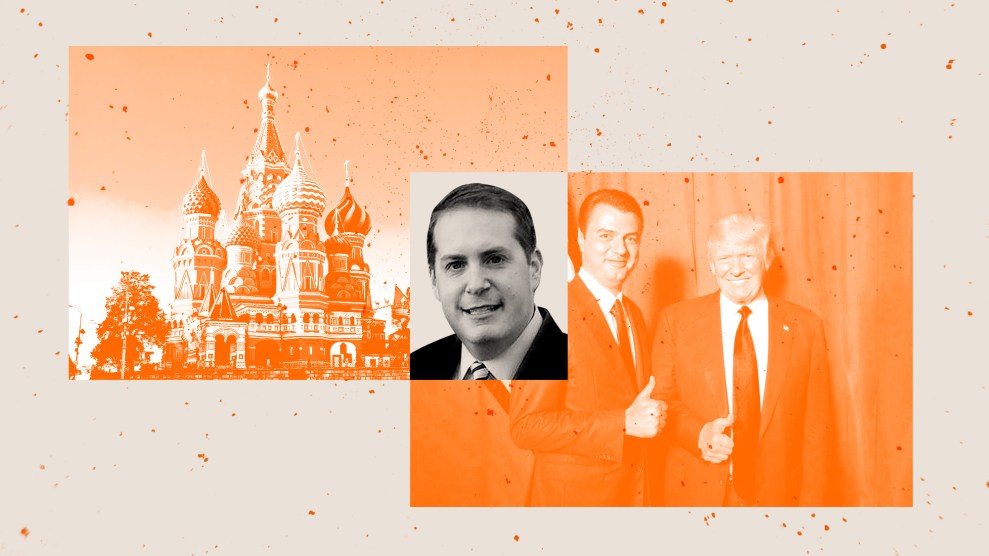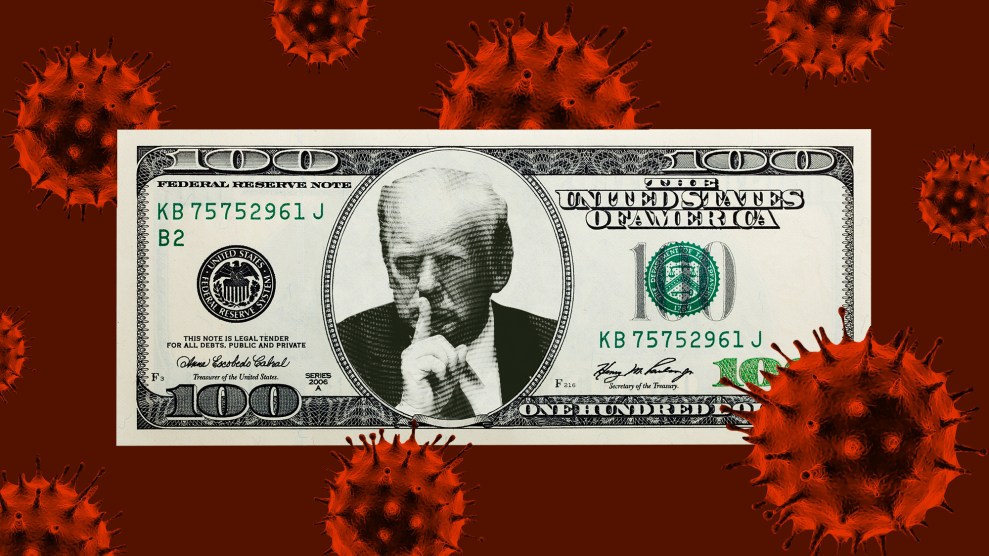
Mother Jones illustration; Getty; Chip Somodevilla/Getty
Steve Gareleck had a problem. His company, NanoPure, had developed an aerosol disinfectant that, it claims, could be an effective weapon against the coronavirus. But he couldn’t start selling it without approval from the EPA. “I need help politically to get this thing to the right people,” Gareleck told me in March. So he forked over $30,000 to a firm run by Brian Ballard, a high-powered lobbyist who is also a top fundraiser for President Donald Trump. Ballard’s team got to work quickly, reaching out directly to the White House and the Health and Human Services Department about the product, according to federal filings.
As COVID-19 started wreaking havoc, K Street lobbyists rushed to scoop up business from companies seeking to market their health products or score federal relief money. Ballard isn’t the only associate of the president who is getting in on the action, but his ability to drum up business in Trump’s swamp has stood out. In 2019, his firm, Ballard Partners, raked in $19.1 million in reported fees—and that doesn’t include its work on behalf of foreign governments. When it comes to selling influence over the most corrupt administration in living memory, the man Politico dubbed “the most powerful lobbyist in Trump’s Washington” has few peers.
“He’s playing the K Street lobbyist game, buying access to this administration and enjoying that access,” said Craig Holman, who works on ethics and lobbying issues for the watchdog group Public Citizen. Holman added that Ballard may not be breaking any laws or ethics rules, but that doesn’t leave the firm beyond reproach, especially given its ties to the scandal-plagued president. “This White House rewards corruption and self-dealing, and Ballard seems to be playing that game,” he said.
Ballard Partners rejects any complaints that it peddles access to the Trump administration. “Any such claims about Ballard Partners are completely baseless,” the firm said in a statement.
But there’s little question that Ballard has a ready line to the president. “One call to Brian Ballard, and the next thing I knew I was on the stage with the president,” Rep. Matt Gaetz told Mother Jones in 2017 about his effort to be seen with Trump at a rally in Florida. Gaetz noted that he was struck by the “speed with which [Ballard is] able to access the Trump apparatus.”
Ballard—a square-faced, brown-haired, 58-year old who tends to be photographed tieless in well-tailored suits—has said he first met Trump in the 1980s after reading The Art of the Deal. He wrote the real estate mogul an admiring letter, and the two struck up a relationship. After working as the chief of staff for Florida Gov. Bob Martinez (R), he launched a lobbying practice in Tallahassee in 1990s. Among his clients was Trump, who owns several properties in the state, including Mar-a-Lago. Ballard reportedly helped the future president push unsuccessfully for Florida to allow resorts to act as casinos.
In 2016, Ballard backed former Florida Gov. Jeb Bush and, then, Sen. Marco Rubio in the GOP presidential race, before finally falling in line behind Trump. Once he was on board, he led the campaign’s fundraising efforts in Florida and chaired the Trump Victory committee, helping raise $108 million for Trump and other Republicans. His firm’s website notes that he “had the honor of serving as a member of the Electoral College casting his vote for President Trump.”
A month after Trump was sworn in, Ballard opened a Washington, DC, office that focuses “on the White House and Executive Agencies.” He’s stocked the firm with Trump associates, including Pam Bondi—the former Florida attorney general. In 2013, Bondi infamously accepted a $25,000 donation from Trump before deciding not to act on complaints filed against Trump University or join New York state in a lawsuit alleging that it had used false advertising and high-pressure sales to push students to pay for expensive—and often useless—real estate seminars. (Bondi and Trump have said there was no connection between the donation and Trump University’s legal issues.) Trump agreed shortly after his 2016 election to pay $25 million to settle the suit but didn’t acknowledge any wrongdoing. Earlier this year, Bondi briefly left Ballard’s firm—where her controversial clients include the government of Qatar—to join Trump’s impeachment defense team.
Other firm employees include Trump transition official Dan McFaul and Justin Sayfie, who lobbies for Ballard while also serving on a Trump-appointed commission on White House fellowships. Raj Shah, a former White House spokesperson, worked for Ballard in 2019. Susie Wiles, who ran Trump’s Florida campaign in 2016, worked for Ballard until leaving last fall for health reasons. Former Rep. Robert Wexler (D-Fla.) and Jamie Rubin, who served as a State Department spokesperson under President Bill Clinton, have boosted the firm’s sway with Democrats.
Meanwhile, Brian Ballard has raised more than $1 million in bundled donations for Trump’s reelection bid and has personally contributed around $200,000 to Trump and the Republican National Committee in the current election cycle. He also serves as a regional vice-chair for the RNC, likely putting him in the position of soliciting donations from some of the same well-heeled Republicans he courts as clients. While Ballard chaired the Trump Victory Committee in 2016, it received a $100,000 donation from Boston Bruins owner Jeremy Jacobs. Jacobs chairs Delaware North, a Buffalo-based casino, resorts, and food services company. In April, Ballard registered to lobby on behalf of Delaware North as it seeks coronavirus relief money from the Trump administration.
Ballard’s firm insists there’s nothing wrong with him raising money for Trump while lobbying the White House. And though its website touts its founder’s Republican fundraising efforts, the firm says its employees “keep our efforts as campaign volunteers and supporters completely separate from our professional work as advocates for our clients.”
Ballard has worked for a host of big-name companies, including Amazon, American Airlines, and Uber. The firm lobbies on behalf of the American Health Care Association, an industry group that represents nursing homes. The AHCA has been pressing states to grant its members immunity from lawsuits over coronavirus deaths in their facilities, though there’s no indication that Ballard Partners has worked on that specific issue.
Ballard also represents the GEO Group, the nation’s largest private prison company. It hired Ballard in early 2017, around the time the Justice Department reversed an Obama-era decision to end the use of private prisons for federal inmates. That April, GEO won a $110 million contract to build an immigration detention complex in Texas. A few months later, it held its annual conference at Trump’s Doral golf club in Florida—one of several Ballard clients to shell out money to Trump-owned properties, according to Citizens for Responsibility and Ethics in Washington.
Ballard has also built a thriving roster of overseas clients. Those have included Russian billionaire David Yakobashvili, a founder of a food conglomerate, who paid the firm $450,000 to lobby on immigration and trade policy. The firm represents a slew of foreign governments, including Kosovo, which is currently under pressure from the White House to agree to a land swap with Serbia. In 2018, Politico reported that Ballard personally lobbied Trump while the president was staying at Mar-a-Lago, in an unsuccessful effort to secure a meeting between Kosovo’s president and Trump.
Some of the firm’s foreign clients have had serious legal problems. In 2018 Ballard lobbied the White House in an effort to stop the Justice Department from indicting its client Halkbank, a state-run Turkish bank, for violating US sanctions on Iran. After Trump asked Attorney General Bill Barr to review the matter, Barr pressed the US attorney in Manhattan to reach a settlement with the bank that would avert an indictment, CNN has reported. The bank was finally charged last year, but only after Turkey invaded Syria—an invasion that caused an uproar in Washington and embarrassed Trump. Ballard terminated its representation of Halkbank after the indictment was announced. (In his forthcoming book, former national security adviser John Bolton reportedly alleges that in May 2018, Trump told Turkish President Recep Tayyip Erdogan that he would intervene with the DOJ on behalf of a Turkish firm—apparently Halkbank. Trump “told Erdogan he would take care of things, explaining that the…prosecutors were not his people, but were Obama people, a problem that would be fixed when they were replaced by his people,” Bolton writes, according to the Washington Post.)
Ballard’s work for Turkey also appears to have intersected with the scandal that resulted in Trump’s impeachment. In November, federal prosecutors subpoenaed the firm for information related to Lev Parnas, the Rudy Giuliani associate who is facing charges for campaign finance violations. Ballard’s attorney said that Parnas, a major GOP donor, had met Ballard through Republican politics in Florida and had helped Ballard land Turkey as a client. Ballard paid Parnas at least $22,500 for the referral.
In January, Parnas gave Congress handwritten notes describing what he says were instructions he received from Giuliani in May 2019, while they were in Europe trying to dig up dirt on former Vice President Joe Biden. On a Ritz-Carlton Vienna pad, Parnas wrote, “Get Zalensky to announce that the Biden case will be investigated”—a reference to Ukrainian President Volodymyr Zelensky. A few pages later, Parnas added, “Hire Robert Stryk”—another lobbyist with Trump ties—“or Brian Ballard.” Neither Stryk nor Ballard was hired. “We have no idea what it means,” William Taylor, an attorney representing Ballard, said in an email at the time. “Nobody reached out to Brian.”
Ballard has represented clients with ties authoritarian regimes and other questionable connections—information the firm hasn’t always initially revealed to the public. In 2018, it reported that it was paid $100,000 to lobby for REC Americas, a solar energy firm that it said was owned by a Norwegian company. It did not disclose that the Norwegian company was, in turn, a subsidiary of a state-owned Chinese company, ChemChina. A REC spokesperson said the firm hired Ballard for advice as it sought an exemption from tariffs that Trump imposed in June 2018 on solar panels. The application didn’t succeed.
Following inquiries from Mother Jones, Ballard Partners filed an amendment to its lobbying registration for REC Americas. The amendment, which came about two years after the work was completed, lists ChemChina, and the People’s Republic of China itself, as foreign entities with an interest in the lobbying activity. William Farah, a lawyer who handles compliance issues for Ballard, said these parties were accidentally omitted. The firm “takes its reporting and compliance obligations very seriously. The oversight was inadvertent, and once it was discovered, a corrective amendment was immediately filed to disclose the additional information,” Farah said.
In April 2018, Ballard registered to lobby for a company called ASM International General Trading. But after the Daily Beast linked that firm to a wealthy Syrian man, Samer Foz, with ties to the dictator Bashar al-Assad, Ballard dropped the client. Ballard said that ASM’s background had escaped his team’s notice. “We’re not the CIA,” he told the Daily Beast.
In June 2019, the Treasury Department’s Office of Foreign Assets Control imposed financial sanctions on ASM, Foz, two of his brothers, and a dozen corporate entities connected to them, due to their work benefitting the Assad regime. Foz “is directly supporting the murderous Assad regime and building luxury developments on land stolen from those fleeing his brutality,” Undersecretary for Terrorism and Financial Intelligence Sigal Mandelker said at the time.
In 2017, a subsidiary of Globovisión—a Venezuelan television station owned by Raúl Gorrín—hired Ballard to help the company expand into US markets. But the Miami Herald reported that Gorrín hoped to establish himself as a broker between Trump and the regime of Nicolás Maduro, to negotiate a transition to a new government, while suggesting he had authority to speak for Maduro. The Justice Department later indicted Gorrín on corruption charges. Ballard said it terminated its work for the company after learning of the investigation; the firm has said it was unaware of Gorrín’s alleged diplomatic machinations.
“We do the best job we can” on due diligence, a Ballard Partners employee told Mother Jones. “When we represent someone and we learn of something we weren’t aware of, our record shows we drop them as soon as something comes out.”
In 2017, Ballard registered to lobby for Hawkers USA, a sunglasses company. Hawkers paid Ballard $430,000 to work on “general government, tax, and trade issues, policies, and regulations,” according to the firm. Ballard did not note in its disclosure forms that Hawkers is a subsidiary of a Spanish company, the Saldum Ventures group. The president and controlling shareholder of that company is Alejandro Betancourt Lopez, a wealthy Venezuelan, who, according to the Herald and the Washington Post, was among unnamed alleged conspirators in a federal criminal complaint detailing an embezzlement and bribery scheme related to Venezuela’s national oil company. Last year Betancourt hired Giuliani, who then met with Justice Department officials to argue that Betancourt should not be charged, the New York Times reported. In August, with Parnas in tow, Giuliani reportedly stayed at an estate owned by Betancourt in Spain, part of a trip in which Giuliani also met secretly with Ukrainian officials in Madrid.
So far Betancourt has not been charged. Jon Sale, an attorney for Betancourt, said his client “denies any wrongdoing” but did not respond to other questions. Giuliani and an attorney for Parnas did not respond to requests for comment.
Bizarrely, Ballard’s representation of Hawkers began just three days after the US Supreme Court declined to hear an appeal of a lawsuit brought by Otto Reich, who was then a Ballard employee. Reich—who once served as ambassador to Venezuela and was a minor player in the Iran Contra scandal—had sued Betancourt and two other Venezuelan men in 2013, alleging they had defamed him by claiming he had done work for them. Reich’s suit, which was thrown out on procedural grounds, also charged that Betancourt and two other men had paid millions of dollars in bribes to win Venezuelan government contracts, awarded in 2010, to build power plants. They denied Reich’s allegations.
In a statement, Ballard Partners said none of its employees ever communicated with Betancourt or Giuliani regarding Betancourt’s “personal, legal or business matters.” The firm said its work had “no relationship in any respect” to Reich’s lawsuit against Betancourt.
Ballard, meanwhile, has continued signing up clients looking for coronavirus business. Laundrylux, a commercial laundry machine supplier in Long Island, hired Ballard to help get its industry designated “essential” by the Homeland Security Department. A Baltimore health technology firm called Audacious Inquiry hired Ballard to help sell the White House on its system for tracking pandemic data entered by medical providers. After retaining Ballard, it appears, the company’s pitch went directly to Vice President Mike Pence, Health and Human Services Secretary Alex Azar, and Jared Kushner, the president’s son-in-law.
On June 5, Ballard Partners disclosed that it had, since May 15, been helping the city of Washington, DC, seek pandemic relief funds from the Trump administration. But on the same day that work was revealed, Brian Ballard announced that the firm was withdrawing from the contract amid a dispute between DC Mayor Muriel Bowser and Trump over the president’s deployment of National Guard troops and unidentified federal law enforcement officers in response to protests in the District against police brutality. “While we were making progress, we are no longer in a position to deliver effective representation, so we have respectfully withdrawn our engagement,” the firm said in a tweet.
As for Garelek, the NanoPure CEO, he’s still waiting on EPA approval for his disinfectant mist. “We’re getting close,” he told me in March, “and we’re talking to right people now.”
Noah Lanard contributed reporting.

